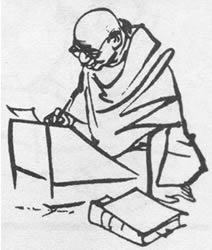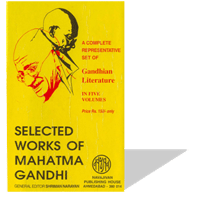
P.O. SEVAGRAM, DIST.WARDHA 442102, MS, INDIA. Phone: 91-7152-284753
FOUNDED BY MAHATMA GANDHI IN 1936
SECTION I : Selected Letters
[ from Selected Works of Mahatma Gandhi : Vol - 4 ]

SELECTED LETTERS
from
Selected Works of Mahatma Gandhi
Volume IV
Table of Contents
- Foreword
- Publisher's Note
SECTION I : LETTERS
- 1. To Dadabhai Naoroji
- 2. To G. K. Gokhale
- 3. To G. K. Gokhale
- 4. To Tolstoy
- 4A. From Count Leo Tolstoy
- 5. To Count Leo Tolstoy
- 6. To Leo Tolstoy
- 6A. From Count Leo Tolstoy
- 7. To Leo Tolstoy
- 7A. From Count Leo Tolstoy
- 8. To Maganlal Gandhi
- 9. To Maganlal Gandhi
- 10. To Narhar Shabhurao Bhave
- 11. To Mr Maffey, Private secretary To Viceroy
- 12. To W. B. Heycock
- 13. To Shankarlal on Ideas About Satyagraha
- 14. To Vinoba Bhave
- 15. To C F Andrews
- 16. To C F Andrews
- 17. To C F Andrews
- 18. To Kasturba Gandhi
- 19. To Kishorelal Mashruwala
- 20. To Sarojini Naidu
- 21. To Srinivas Sastri
- 22. To Srinivas Sastri
- 23. To Rabindranath Tagore
- 23A. From Rabindranath Tagore
- 24. To Rabindranath Tagore
- 25. From Rabindranath Tagore
- 25A. To Rabindranath Tagore
- 26. From Rabindranath Tagore
- 26A. To Rabindranath Tagore
- 27. To Rabindranath Tagore
- 28. To Rabindranath Tagore
- 29. To Rabindranath Tagore
- 30. To Rabindranath Tagore
- 31. To Rabindranath Tagore
- 32. From Rabindranath Tagore
- 32A. To Rabindranath Tagore
- 33. From G S Arundale
- 33A. To G S Arundale
- 34. To Every Englishman In India
- 35. To Viceroy
- 36. To Jawaharlal Nehru
- 37. To Jawaharlal Nehru
- 38. To Jawaharlal Nehru
- 39. To Jawaharlal Nehru
- 40. From Jawaharlal Nehru
- 41. To Jawaharlal Nehru
- 42. To Konda Venkatappayya
- 43. To T Prakasam
- 44. To Hakim Ajmal Khan
- 45. To Jamnalal Bajaj
- 46. To Mohomed Ali
- 47. To Motilal Nehru
- 48. To Motilal Nehru
- 49. To C Rajagopalachari
- 50. To C Rajagopalachari
- 51. To Kakasaheb Kalelkar
- 52. To A Friend
- 53. From Madeleine Slade or Miraben
- 53A. To Madeleine Slade
- 54. To Romain Rolland
- 55. To Romain Rolland
- 56. To Shri Shankaran
- 57. To Hermann Kallenbach
- 58. To Gulzarilal Nanda
- 59. To Dr Kailas Nath Kaju
- 60. To Dhan Gopal Mukherjee
- 61. To Henry S Salt
- 62. To The Viceroy
- 63. To Lord Irwin
- 64. To Reginald Reynolds
- 65. To Richard B Gregg
- 66. To Sir Samuel Hoare
- 67. To Ramsay MacDonald
- 68. To Pandit Malaviyaji
- 69. To The Secretary To The Government of Bombay, (Home Dept.), Poona
- 70. To Sir Tej Bahadur Sapru
- 71. To Carl Heath
- 72. To Carl Heath
- 73. To Carl Heath
- 74. To M A Jinnah
- 75. To M A Jinnah
- 76. To M A Jinnah
- 76A. From M A Jinnah
- 77. To M A Jinnah
- 78. From Subhash Chandra Bose
- 78A. To Subhash Chandra Bose
- 79. To Herr Hitler
- 80. To Every Briton
- 81. To Every Briton
- 82. To Generalissimo Chiang Kai-Shek
- 83. To Every Japanese
- 84. To American Friends
- 85. To Lord Linlithgow
- 86. To Lord Linlithgow
- 86A. From Lord Linlithgow
- 87. To Lord Linlithgow
- 87A. From Lord Linlithgow
- 88. To Lord Linlithgow
- 88A. From Lord Linlithgow
- 89. To Lord Linlithgow
- 90. To Agatha Harrison
- 91. To Winston Churchill
- 92. To Shriman Narayan
- 93. To Lord Pethick Lawrence
- 94. To Sardar Vallabhbhai Patel
- 95. To The Viceroy
- 96. To The Viceroy
- 96A. From Lord Mountbatten
- 97. To Abdul Ghaffar Khan
- 97A. From Abdul Ghaffar Khan
- 98. To A Friend
- 99. To Madame Edmond Privat
- 100. To The People of Gujarat
- Appendix I: Who Should Be Provincial Governors?
- Appendix II: A Psychological Explanation
- Appendix III: The Gandhian Constitutions for Free India
SECTION II : EXTRACTS FROM LETTERS
- Faith in God
- Religions and Scriptures
- Value of Prayer
- Truth and Non-violence
- The Science of Satyagraha
- Fasting in Satyagraha
- Unto This Last
- Khadi and Village Industry
- East and West
- Hindu-Muslim Unity
- Upliftment of Women
- The Good of All
- India's Freedom
- Education
- Caste System and Untouchability
- Brahmacharya
- Fearlessness
- Health and Hygene
- Self-restraint
- Self-development
- Selfless Service
- Voluntary Poverty
About This Volumes

Selected Works of Mahatma Gandhi comprises of Five volumes.
- Vol-I: Autobiography
- Vol-II: Satyagraha in South Africa
- Vol-III: Basic Works
- Ethical Religion
- Unto This Last
- Hind Swaraj or Indian Home Rule
- From Yeravada Mandir
- Discourses on the Gita
- Constructive Programme
- Key to Health
- Vol-IV: Selected Letters
- Vol-V: Voice of Truth
This book, Selected Letters, is volume-4.
Written by : M. K. Gandhi
General Editor : Shriman Narayan
Volume
Selected Works of Mahatma Gandhi : A set of five books
ISBN: 81-7229-278-3 (set)
Printed and Published by :
Jitendra T. Desai
Navajivan Mudranalaya,
Ahemadabad-380014
India
© Navajivan Trust, 1968
Download
Appendix III : The Gandhian Constitutions for Free India
Perhaps the expression 'Gandhian Constitution' is
not a fitting title for Principal Agarwal's pages. It may be acceptable
as a convenient and compact title. The framework is really Principal
Agarwal's, based on his study of my writings. He has been interpreting
them for a number of years. And as he is anxious not to misin¬terpret
them in any way he would publish nothing without my seeing it. This
is both an advantage and a disadvantage. The advantage is obvious.
The disadvan¬tage lies in the reader mistaking the particular
writing being my view in every detail. Let me then warn him against
making any such mistake. If I were to commit myself to every word
appearing in these pages, I might as well write the thing myself.
Though I have endeavoured to read the constitution twice, with as
much attention as I was able to bestow on it during my other engagements,
I could not undertake to check every thought and every word of it.
Nor would my sense of propriety and individual freedom permit me to
commit any such atrocity. All therefore I am able to say is that the
brochure contains ample evidence of the care be¬stowed upon it
by the author to make it as accurate as he could. There is nothing
in it which has jarred on me as inconsistent with what I would like
to stand for.
The author was good enough to make such alterations as I thought necessary.
The word "constitution" must not mislead the reader into
thinking that the author has made any profession to give him a complete
constitution. He has made it perfectly clear in the beginning pages
that he has only laid down broad lines to indicate what a constitution
of my conception would be. I regard Prin¬cipal Agarwal's to be
a thoughtful contribution to the many attempts at presenting India
with Constitutions. The merit of his attempt consists in the fact
that he has done what for want of time I have failed to do.
M. K. GANDHI
On the train to Calcutta,
30th November, 1945